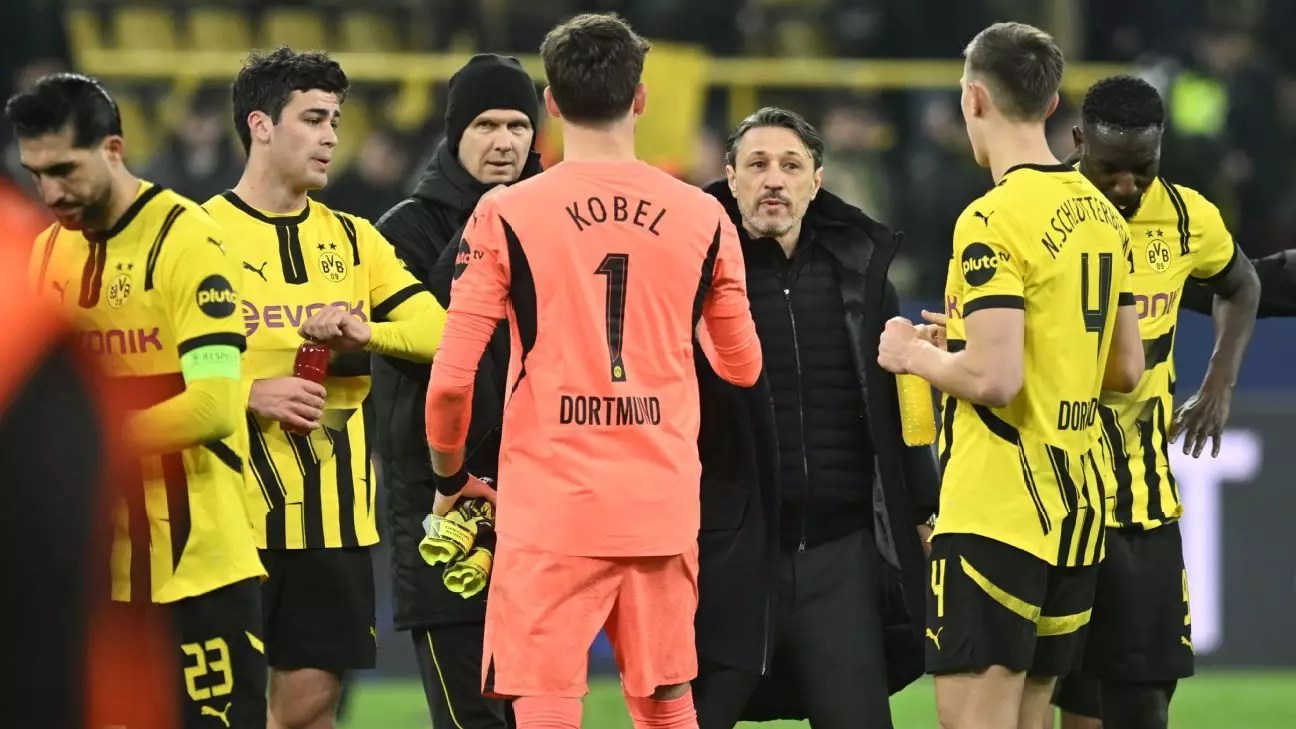As the Bundesliga season unfolds, Borussia Dortmund finds itself navigating treacherous waters. Eight matches into the 2023 season, they languish outside the top half of the table—an astonishing concern for a club that boasts significant resources and a reputation for excellence. One would expect this storied franchise to be a fixture near the summit of German football; instead, fans are grappling with a familiar sense of frustration.
This season began with a glimmer of hope. The echoes of an improbable UEFA Champions League final appearance still reverberated, and the summer transfer window seemed promising. Key signings—Waldemar Anton and Serhou Guirassy, both from VfB Stuttgart, along with the talented Maxi Beier from TSG Hoffenheim—fueled optimism among supporters. The departures of stalwarts Marco Reus and Mats Hummels were viewed as a necessary transition towards a revitalized vision for the club, and fans hoped for a fresh beginning under a coach who understood the ethos of Borussia Dortmund.
Echoes of the Past: Stallgeruch and Change
In Dortmund, the phrase “Stallgeruch,” denoting a connection to the club’s roots, holds significant weight. The acumen of a local legend like Nuri Şahin, who returned to the club as an assistant, was presumed to bring an aura of familiarity. Meanwhile, Lars Ricken ascended to the role of sporting CEO, creating a ripple in the hierarchy of club leadership that carried with it both promise and uncertainty.
The first half of the season, however, has revealed a profound disintegration of consistency: while Dortmund dominates at home, their away performances scream fragility. Despite a contrasting success in the Champions League, a devastating early exit from the DFB-Pokal underscored the lurking issues within. The Hummels and Reus departures seemed to send shockwaves through the squad, highlighting an atmosphere ripe for introspection.
The Winter Plunge and the New Era
A pivotal moment arrived when the calendar turned to 2024. Defeats against title holders Bayer Leverkusen and competitive rivals Eintracht Frankfurt reinforced the shadows that loomed over the club. A particularly embarrassing setback against Kiel exacerbated doubts about the team’s capabilities. The culmination of disappointing performances mounted, leading to Şahin’s dismissal after a fourth consecutive loss during a European fixture in Bologna.
Enter Niko Kovač—an initial choice seen as logical but fraught with challenges. Known for his intense work ethic and fitness demands, Kovač symbolizes both a fresh perspective and a demand for rapid results. His first match saw Dortmund’s fitness flaws painfully exposed, highlighting vast discrepancies in physical readiness when confronted with high-stakes matches.
Bouncing Back: Key Moments Ahead
Dortmund’s upcoming fixtures pose both opportunity and risk. With a match against Augsburg—a team unexpectedly resilient on the road this season—lingering on the calendar, the stage is set for a stern test of Kovač’s mettle and leadership. Following that, the tasks against Lille in the Champions League and against RB Leipzig could either mark a turning point or solidify a grim narrative about Dortmund’s season.
While the statistics paint a concerning picture, an examination of the club’s players unveils critical insights into their decline. Once admired for cultivating young talent, Borussia Dortmund now appears to be losing its allure in this regard. The likes of Julian Brandt and Gio Reyna have failed to rise to the occasion, dampening expectations among both fans and analysts. In comparison, players reaching prominence at clubs like Eintracht Frankfurt are now stealing the spotlight from Dortmund’s former claim to fame.
Identity Crisis: Who is Borussia Dortmund Today?
As fans reflect on the current state of affairs, the question lingers: Who is Borussia Dortmund in this era of uncertainty? The club has transitioned from a breeding ground for the next generation of talents like Erling Haaland and Jude Bellingham to a side now struggling to maintain its historical significance.
The upcoming matches should render a clearer perspective on whether this transformation can yield positive results or if it merely reinforces a sense of mediocrity hovering over one of Germany’s iconic teams. The pressure is palpable—all eyes will be on how Kovač harnesses his players’ potential in these crucial encounters that could ultimately define Dortmund’s season and their future trajectory.
In the end, the echoes of history are calling for a return to the footballing brilliance that once set Borussia Dortmund apart. Whether they can reclaim their status as a powerhouse remains to be seen, but the path ahead is fraught with challenges demanding perseverance, commitment, and an unwavering belief in their identity as a club.


Leave a Reply